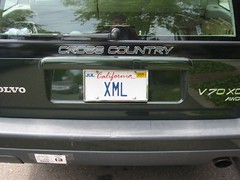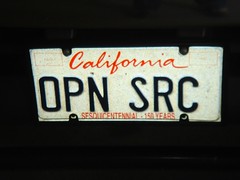(did you read live long and prosper?)



Away from Keyboard? :P
and finally here's something to laugh a bit about

Your Latest In Tech News
Apple is one of the major leaders in the multitouch space and yet, the company's desire to bring a full-fledged touch-screen device to store shelves has stopped with the iPhone. In fact, the most it has done in bringing multitouch to its computers is offering the functionality in the track pad on its MacBook Air.
But simply offering multitouch on a trackpad isn't enough to make consumers want to flock to Apple products instead of HP or Dell machines. Instead, Apple needs to embrace the fact that many people prefer touch-screen technology and create a Mac that offers the same basic functionality found in the iPhone.
Innovation has been a key to Apple's success over the past decade and without it, the company would be nothing more than another computer vendor. But by releasing a Mac that eclipses the functionality of the tablet PC and fully harnesses the power of multitouch in a way that no one has seen before, Apple can create the computing world's first iPhone-like success.
And in the process, Apple could single-handedly propel the computing market forward into a new era where vanilla products are the exception and establish itself as the de facto leader in innovation.
The computing market may be an entirely different space than the cell phone market, where a touch screen is more desired, but we can't forget that it's still being dictated by the common desire of all consumers to use the single product that does what no other device can. And with the world's first touch screen, multitouch Mac in place, Apple can recreate the same iPhone scenario in the computing market and in the process, make competing vendors and Microsoft look outdated.
But Microsoft isn't so naive. The company has already started developing touchscreen technology of its own in the Surface, and has its own plans about what the future of touchscreens could hold. And although it's a much different technology than what I'm suggesting Apple provide, it highlights one important fact: when a company is willing to put its money behind ingenuity, game-changing products result.
Apple is well on its way to developing a full-fledged touch-screen Mac. The company's MacBook Air already sports multitouch technology on its trackpad and its iPhone is a prime example of its ability to create a product in that vein that people actually want.
So what would it look like? Ideally, the computer could be controlled with the touch screen and if you prefer, you can type on it as well. For those who aren't so keen on typing on a virtual keyboard, Apple's touch-screen Mac should sport a physical keyboard that can be slid out. In terms of aesthetics, I'll leave that up to Apple--I think it has proven to be quite capable in designing handsome products.
Right now, Apple has well over $18 billion just sitting in its coffers waiting to be used. And although a touch screen Mac would undoubtedly cost the company quite a bit and possibly cut down on margins, it's a risk worth taking. Sure, the price may be higher, but if the iPhone is any indication of buyer preference, it's quite apparent that consumers are willing to pay substantially more for a product that's both unique and more capable than any product in the market.
Why Apple and not Dell or HP? It's simple--Apple is the only company in the market that's willing to risk failure to be the most innovative and beloved company in the space. On top of that, Apple is the only company in that market that truly has a pulse on the desires of most consumers.
Of course, developing a touch-screen Mac won't be easy for Apple. It will need to modify its OS and ensure that it can interact with an entirely different computing style. Because of that, it may take some time for Apple to get up the courage (and quality) to release such a product. That said, it should endeavor to do so as soon as possible.
Right now, Apple is slowly gaining ground on HP and Dell in hardware sales and is the third-most popular hardware manufacturer in the world. And although it has been able to catch Acer and the rest, beating Dell and HP may be difficult. But by releasing a product that was once thought impossible, Apple can solidify itself as the company that's willing to go the extra mile to provide users with the products they truly want. And in the process, I think it could gain significant market share quite quickly.
There's no telling what Apple has up its sleeve in the coming weeks and although speculation abounds, there's no way to know if a new Mac will even hit store shelves. But if Apple finally does release a new Mac, it should harness the power of touch-screen technology.
It may be expensive and it may not appeal to everyone. But that's the same thing that was said about the iPhone and I think we all know how well that went for Apple.
http://news.cnet.com/8301-13506_3-10024869-17.html?tag=nefd.riv
Updated at 2:40 p.m. PDT with more details about Firefox 3.1 features.
Firefox 3.1 will run many Web-based applications such as Gmail faster through incorporation of a feature called TraceMonkey that dramatically speeds up programs written in JavaScript, Mozilla said Friday.

JavaScript has been very broadly used to add pizzazz or flexibility to Web pages over the years, but in recent years, it's also become the plumbing for many rich Internet applications. However, because JavaScript has been hobbled by pokey performance, Web-based applications often struggled to work as responsively as "native" software running directly on PCs, and programmers writing Web applications have often turned to other options, such as Adobe Systems' Flash and Flex.
Now Mozilla hopes to change the balance of power in JavaScript's favor.
"TraceMonkey is a project to bring native code speed to JavaScript," said Mike Shaver, Mozilla's interim vice president of engineering, adding that JavaScript performance nearly doubles compared to Firefox 3.0, based on the SunSpider test of JavaScript performance. That speeds up many basic tasks, but it also brings image editing and 3D graphics into JavaScript's abilities, he said.
On Thursday, Mozilla programmers built TraceMonkey into the latest developer version of the open-source Web browser, and it will appear in the next released test version, which likely will be the first beta of Firefox 3.1, Shaver said. Firefox 3.1 is due in final form by the end of the year, though Mozilla is willing to let the schedule slip a bit, if necessary.

TraceMonkey dramatically improves the speed of many JavaScript operations. (Click to enlarge.)
(Credit: Mozilla)JavaScript execution speed can make surfing the Web snappier, so naturally, it's a key part of the resurgent browser wars between Microsoft's Internet Explorer, Mozilla's Firefox, Apple's Safari, and Opera. "We're as aware as anybody that the market is competitive again," Shaver said.
The SunSpider JavaScript test shows a boost of 83 percent, according to programmer and JavaScript pioneer Brendan Eich, who has worked on TraceMonkey and blogged about it on Friday. However, that speed test is an artificial benchmark that is an imperfect reflection of actual JavaScript applications such as Yahoo's Zimbra e-mail software.
Another illustration of TraceMonkey speed is a video of photo editing. Contrast and brightness adjustments take about 100 milliseconds instead of more than 700.
Shaver discussed TraceMonkey on his own blog too.
TraceMonkey explained
TraceMonkey's name is a cross between SpiderMonkey, Mozilla's current engine for interpreting JavaScript code, and a technique called tracing developed at the University of California at Irvine by Andreas Gal and others. Gal is TraceMonkey's lead architect, Shaver said.
TraceMonkey is what's called a just-in-time compiler, one type of technology that solves the problem of converting programs written by humans into instructions a computer can understand.
Most software that runs on people's computers is already compiled in advance into what's called a binary file, but JavaScript usually is interpreted line by line as it runs, a slower process. "We're getting close to the end of what you can do with an interpreter," Shaver said.
A just-in-time compiler, though, creates that binary file on the fly as the code arrives--when a person visits a new Web page, and the browser encounters JavaScript, for example.
TraceMonkey concentrates only on translating selected high-priority parts of software, though. By tracing and recording JavaScript program execution, TraceMonkey finds loops of repeated activity where programs often spend a lot of time. These loops of actual software behavior then are compiled into native instructions the computer can understand.
In contrast, some compilers translate the entire program, a burdensome process that involves mapping all possible paths the computer can take through the code and trying to figure out which are most important. Tracing technology, based on the actual execution of the program, concentrates only on the areas that actually occupy the computer.
"It lets us focus our optimization energy on the parts of the program that matter most," Shaver said.
That concentration means that TraceMonkey doesn't require a lot of memory or a slow-loading plug-in, Shaver said. And it also means that it's good for mobile devices, one of Mozilla's main focuses for browser development.
There's still a lot of work to be done in improving Web-based applications, though. Mozilla's next priority is improving the DOM--the document object model elements of Web browsers that are in charge of drawing and manipulating the Web page overall.
Although TraceMonkey currently is built into the new developer version of Firefox 3.1, it's disabled by default to begin with. "We did that because we want to get wider feedback," Shaver said.
Also in Firefox 3.1
Other significant changes will arrive in Firefox 3.1, Shaver said.
One is support for threading by JavaScript programs. Threads are instruction sequences, and newer multicore processors are able to run multiple threads simultaneously. Software support for that will mean JavaScript programs can execute some tasks in the background better, Shaver said.
Another is the built-in ability to play music encoded with the Ogg Vorbis format and video encoded with the Ogg Theora format. These formats, while not nearly as widely used or as supported as rivals such as MP3, are free from proprietary constraints such as patents, Shaver said, and therefore can be added to an open-source project such as Firefox.
"We're excited to bring unencumbered, truly open-source video to the Web," Shaver said. The support also works on all operating systems Firefox supports.
Mozilla will start encouraging Firefox users more actively to move to the current version soon. In about the next two weeks, Firefox 2 users will start getting messages to upgrade to version 3, Shaver said.
Currently, when copies of Firefox 2 check Mozilla servers to see if there's an update, the servers don't say to move all the way to version 3, so users must manually update.
"We're looking at doing that in the next two weeks," Shaver said. "The majority of users are still on Firefox 2."
http://news.cnet.com/8301-1001_3-10023723-92.html?tag=nefd.lede